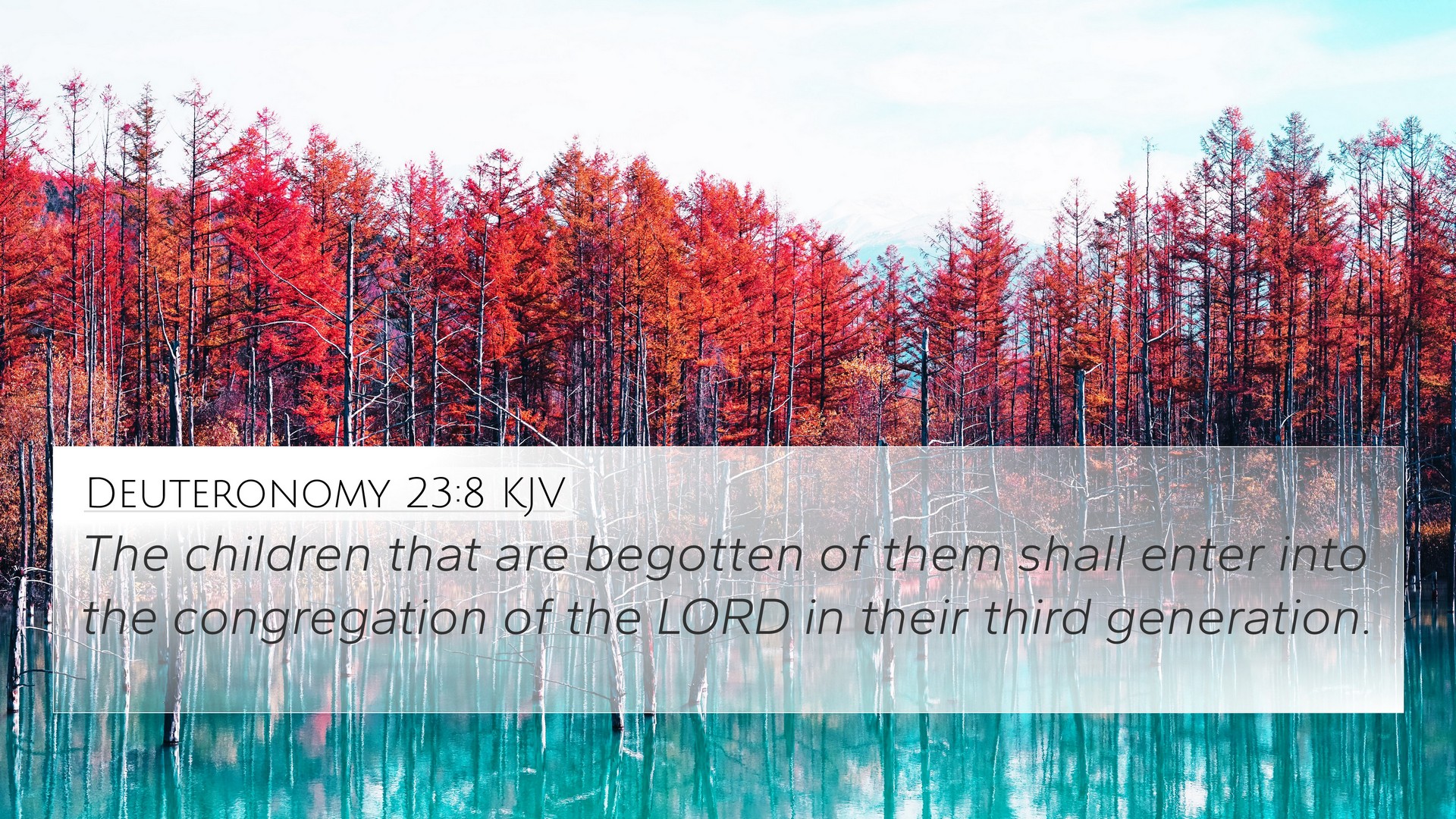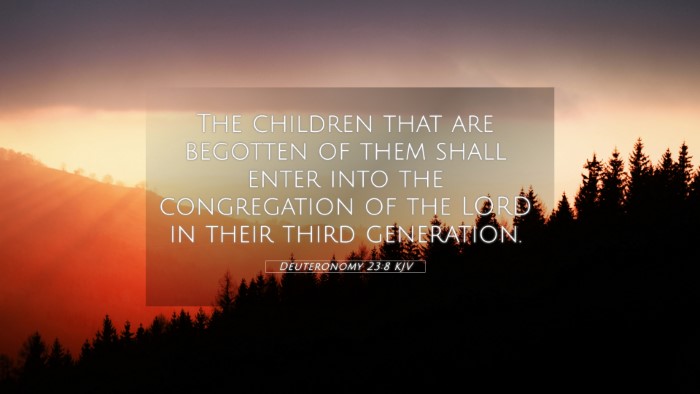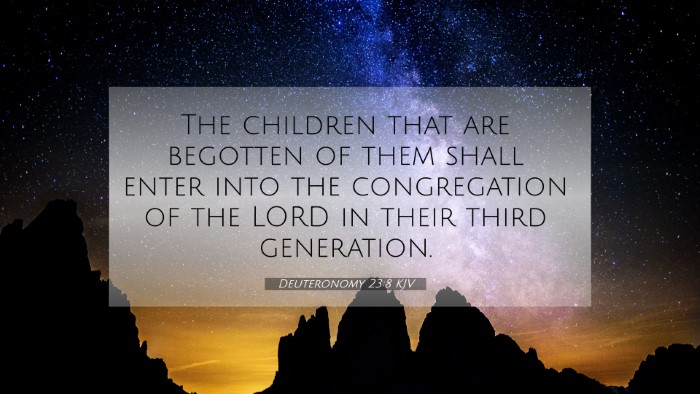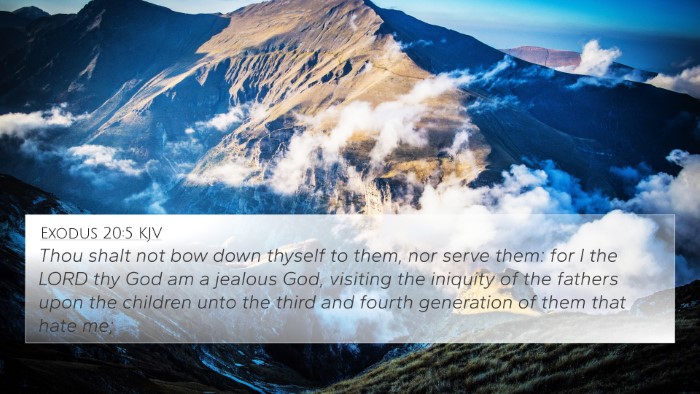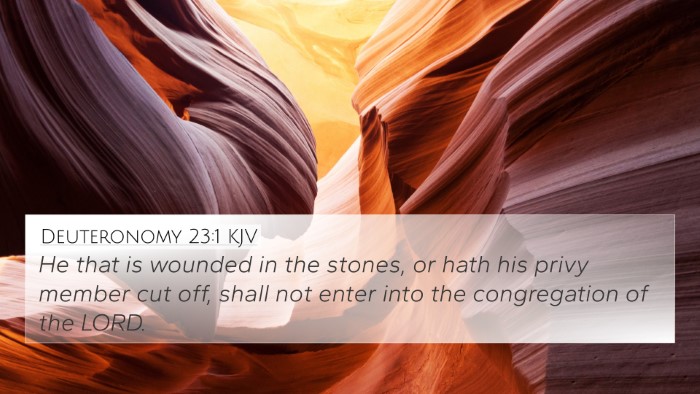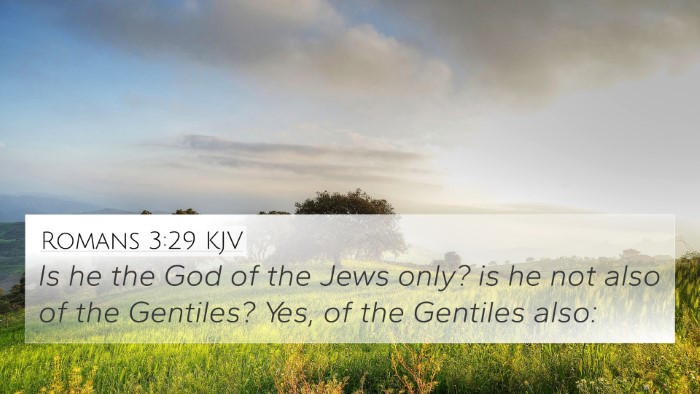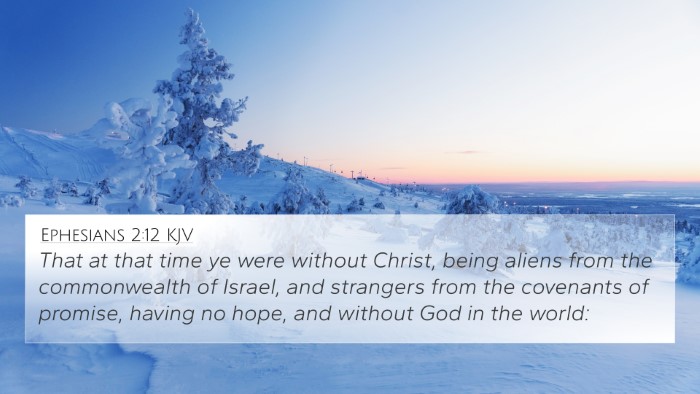Understanding Deuteronomy 23:8
Verse: "The children that are begotten of them shall enter into the congregation of the LORD in their third generation." (Deuteronomy 23:8, KJV)
Meaning and Interpretation
The passage in Deuteronomy 23:8 addresses the issue of who may enter the congregation of the Lord, particularly regarding the descendants of certain individuals. This prohibition and eventual allowance highlight themes of exclusion and inclusion within the Israelite community.
Historical Context
Understanding this verse involves recognizing the context of ancient Israelite society, where lineage and purity of descent were paramount. The community’s rules surrounding who could worship in God’s presence emphasized maintaining holiness in their worship practices.
Commentary Insights
-
Matthew Henry: Henry notes that this verse illustrates God's mercy over time, allowing the third generation of certain excluded peoples to enter the congregation. This reflects the gradual inclusion of those once deemed unclean or outside the covenant community.
-
Albert Barnes: Barnes points out that the term "children" refers specifically to the offspring of those who were originally excluded; they were given the opportunity to fully participate in the religious life of Israel, demonstrating a shift towards a more inclusive understanding of community membership.
-
Adam Clarke: Clarke emphasizes the importance of the third generation, suggesting that while the sins of the fathers could have repercussions, individuals could experience a restoration of their standing before God based on their own actions and faithfulness.
Biblical Cross-References
Deuteronomy 23:8 is interconnected with several other scriptures that illustrate the important biblical theme of generational consequences and restorative inclusion:
- Numbers 14:18 - "The LORD is slow to anger and abundant in mercy, forgiving iniquity and transgression..." This verse emphasizes God's mercy, which resonates with the message of Deuteronomy 23:8 regarding future generations.
- Ezra 10:3 - "...and let us make a covenant with our God to put away all the wives and their children..." This shows the concern for the purity of the Israelite community, linking to the broader theme of inclusion based on faith rather than ancestry.
- Matthew 1:12 - "And after they were brought to Babylon, Jeconiah begat Salathiel; and Salathiel begat Zorobabel;" This genealogy highlights how God's purposes unfold over generations, culminating in Jesus’ lineage.
- Psalm 78:5-6 - "For he established a testimony in Jacob, and appointed a law in Israel, which he commanded our fathers, that they should make them known to their children..." This verse reinforces the idea that knowledge of God’s ways should be passed down through generations.
- Isaiah 56:3-5 - "Let not the foreigner who has joined himself to the LORD say, 'The LORD will surely separate me from His people...'" God's promise of inclusion for all who seek Him parallels the message of Deuteronomy.
- Acts 10:34-35 - "Then Peter opened his mouth and said: 'In truth I perceive that God shows no partiality...'" This New Testament passage reflects the inclusive nature of God’s grace and reinforces the relevance of Deuteronomy 23:8.
- Galatians 3:28 - "There is neither Jew nor Greek, slave nor free, male nor female, for you are all one in Christ Jesus." This verse speaks to the breaking down of barriers that had previously defined worship and community.
Application and Reflection
This verse encourages readers to consider the implications of exclusion and inclusion within their religious communities. It challenges them to reflect on how they treat those who have different backgrounds:
- Generational Faithfulness: It urges the faithful to pass down teachings and the love of God to their descendants, knowing that they may be granted inclusion based on their faith.
- Mercy and Restoration: It emphasizes a God who is willing to restore and accept those who seek Him, despite previous exclusions.
- Inclusivity in Worship: The passage invites modern congregations to embrace diversity, interpreting God’s laws through the lens of love and mercy.
Conclusion
Deuteronomy 23:8 encapsulates a profound aspect of divine governance—balancing justice with mercy and illustrating God's willingness to restore relationships. Through the lens of historical context, commentary insights, and cross-referenced scriptures, this verse challenges believers to broaden their understanding of inclusivity within the community of faith.
Related Themes for Further Study
For those interested in exploring similar themes, consider studying the following:
- How to find cross-references in the Bible
- Comparative studies of Pauline epistles and their emphasis on unity
- Bible verses related to inclusion and community
- Exploring links between the Old Testament law and New Testament grace
